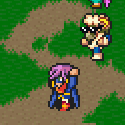 Add Review
Add Review Subscribe
Subscribe Nominate
Nominate Submit Media
Submit Media RSS
RSS
n (589,3 nm) = 1,(???)
 NTC3
NTC3- 02/07/2017 10:19 PM
- 2134 views
Shine is one of those surprise gems I visit RMN for. It starts off with a group of youngsters trapped in a confined place and forced to go along with an unbeatable authority’s will as they take part in their game with malevolent meaning, and which tests their bonds and makes them turn on each other. This premise had some reasonably well-known antedecents: in non-game fiction, for instance, The Green Room, and Ender’s Game both operate with such ideas, and the latter has more in common with Shine then might appear at first glance.
However, the main inspiration is clear to anyone who has ever been interested in the VN genre: it’s the Danganronpa and Zero Escape series. Shine aims to be like them, to the point of frequently using 9 Hours, 9 Persons, 9 Doors OST alongside the RTP tracks. Of course, many an RPG on this place aimed to be like Final Fantasy and took that franchise’s classic themes for itself, often with underwhelming results. Thankfully, Shine manages to provide a memorable experience on its own, mainly through a rare understanding of narrative pace.
Gameplay
Shine is probably the closest RMN has come to a “cutscene game” without being a literal cutscene (which actually exists on here, and is called Do You Remember My Lullaby?) As such, you’re only allowed to take control of your character, named Carter, for two instances in the game: the former to save and see some optional conversations between your initial class, the latter for much the same reasons, as well as to initiate a transition to a crucial plot element in a more natural way.
While I do wish there could’ve been more interactivity involved, the experience we already have works so well as it is, it’s not truly hurt by minimizing it to such a degree. It did, however, mean that developer and translator had omitted to pay those brief sections much attention, and while they’re thankfully free of noticeable bugs, there’s both the design incongruence of being able to save anywhere alongside a dedicated save point, and the linguistic one of other menu functions left bizarrely untranslated:


As well as the embarrassing error of forgetting to remove default character creation equipment on the main character.
Aesthetics (art, design and sound)
I’ve already discussed the OST earlier. If you thought that the music which played while you read text of people mistrusting each other in one game would not work under the same circumstances in another, I can safely assuage such concerns. The sounds used here are mainly those of option selects/notifications whenever someone does a choice in the game they’re caught up in, and it works fine. The RTP graphics and effects all do their job, especially considering they’re half-covered by text boxes 95% of the time anyway. Some CGs are also used at key points, like explaining what “Shine” is, and they are again fine.
Storyline
Shine begins on what is a normal college day: some students are late, others haven’t arrived at all: 4 out of 14, to be exact. When they see that their teacher hasn’t arrived either, in spite of the important assignment some are meant to be handing in, they go through normal concerns, like wondering whether leaving it on the desk and walking out after 10 minutes would work. Then, they notice something strange outside, and the game already established its mastery of small things by not showing it immediately, but instead building up tension over the next few puzzled exchanges, before showing you the real reason: that of everyone seemingly freezing in place, as if time itself stood still. It’s a disturbing occurrence, which they try to rationalize regardless:

Some even attempt to convince themselves everything is a prank after it turns out doors are barred, the mobile reception is gone, and the voice of someone calling themselves Vox comes in through the loudspeakers and politely tells them what he wants: for someone to reach 20 points in his games, played through pre-provided tablets, so that they can then leave the room. The first game? A deceptively simple “pick the number” variation on a prisoner’s dilemma, and if those words mean anything to you, you can guess at how it goes – which doesn’t it make it less affecting, or the way the underlying reasoning was revealed less fascinating. There, Shine clearly shows it won’t shy away from the flaws of human nature, nor blow them out into defining archetypes, for it is the additive effect of the various shortcomings and mediocrities alongside the values and talents that makes us who we are. And once our group is allowed to come to terms with that, a secondary character notices something else:

A simple question to be sure; but the game seems so set on its initial claustrophobic location, and sufficiently interested in progressively developing the characters in it, that the possibility of a larger change simply isn't something you consider before then. This is what I truly appreciated about Shine: unlike most RMN games, or games in general, the characters were for once ahead of me as a player in figuring out what’s going on, instead of the opposite (Immortal was a rather egregious recent example.) It managed to keep this up admirably throughout, though providing further examples would be going into a spoiler territory. Just know that there’s a masterful game of Mafia to beplayed observed, for instance; the lack of interactivity means that observer is what your role really is, although it does allow for both unexpected plot moves, as well as the tight pacing through being able to quickly tell, rather than show and play, anything you’ve already experienced and understood earlier in the game. There are other plot threads at hand too, being hinted at, then re-emerging just as we’ve started to forget about them. One instance is the time when it first appears we are given an inside look into our protagonists’ psychological breakdown.

Which turns out to be something rather different, and then rather different again.
One thing that could’ve been touched on more, perhaps, is the characters’ shared past (they’re all supposedly students of the same place after all), which is practically ignored. Similarly, none of the characters are shown thinking about their family in the outside world. True, such moments can feel predictable and overdone in many games, but I think the creator would’ve been able to execute it as well as they do everything else.
Finally, it must also be said that the handlers of the experiment are also done well. The creator resisted the easy temptation of making them “iconic” through gratuitous villainy, and so instead the more you see of them, the more believable they become. Their behavior reflects the way an actual established structure would work for its long-term benefit, avoiding both the positive and negative deviations from the course. As such, they neither commit any pointless violence, nor show much concern or provide information beyond what’s immediately necessary for their goals. This also means that the game ends on a cliffhanger of sorts, where the characters’ future is certainly not assured, and there’s enough ambiguity to allow for many conceivable Shine Part Twos, which is just as well for me.
And traditionally, a typo for the creator:
Conclusion
I wish it would’ve been possible for more games to integrate the undeniable narrative strengths of games like Shine with the more active gameplay & decision-making process. Nevertheless, what we have here already deserves being taken note of, as well as any way in which this storyline might continue.
However, the main inspiration is clear to anyone who has ever been interested in the VN genre: it’s the Danganronpa and Zero Escape series. Shine aims to be like them, to the point of frequently using 9 Hours, 9 Persons, 9 Doors OST alongside the RTP tracks. Of course, many an RPG on this place aimed to be like Final Fantasy and took that franchise’s classic themes for itself, often with underwhelming results. Thankfully, Shine manages to provide a memorable experience on its own, mainly through a rare understanding of narrative pace.
Gameplay
Shine is probably the closest RMN has come to a “cutscene game” without being a literal cutscene (which actually exists on here, and is called Do You Remember My Lullaby?) As such, you’re only allowed to take control of your character, named Carter, for two instances in the game: the former to save and see some optional conversations between your initial class, the latter for much the same reasons, as well as to initiate a transition to a crucial plot element in a more natural way.
While I do wish there could’ve been more interactivity involved, the experience we already have works so well as it is, it’s not truly hurt by minimizing it to such a degree. It did, however, mean that developer and translator had omitted to pay those brief sections much attention, and while they’re thankfully free of noticeable bugs, there’s both the design incongruence of being able to save anywhere alongside a dedicated save point, and the linguistic one of other menu functions left bizarrely untranslated:


As well as the embarrassing error of forgetting to remove default character creation equipment on the main character.
Aesthetics (art, design and sound)
I’ve already discussed the OST earlier. If you thought that the music which played while you read text of people mistrusting each other in one game would not work under the same circumstances in another, I can safely assuage such concerns. The sounds used here are mainly those of option selects/notifications whenever someone does a choice in the game they’re caught up in, and it works fine. The RTP graphics and effects all do their job, especially considering they’re half-covered by text boxes 95% of the time anyway. Some CGs are also used at key points, like explaining what “Shine” is, and they are again fine.
Storyline
Shine begins on what is a normal college day: some students are late, others haven’t arrived at all: 4 out of 14, to be exact. When they see that their teacher hasn’t arrived either, in spite of the important assignment some are meant to be handing in, they go through normal concerns, like wondering whether leaving it on the desk and walking out after 10 minutes would work. Then, they notice something strange outside, and the game already established its mastery of small things by not showing it immediately, but instead building up tension over the next few puzzled exchanges, before showing you the real reason: that of everyone seemingly freezing in place, as if time itself stood still. It’s a disturbing occurrence, which they try to rationalize regardless:

Some even attempt to convince themselves everything is a prank after it turns out doors are barred, the mobile reception is gone, and the voice of someone calling themselves Vox comes in through the loudspeakers and politely tells them what he wants: for someone to reach 20 points in his games, played through pre-provided tablets, so that they can then leave the room. The first game? A deceptively simple “pick the number” variation on a prisoner’s dilemma, and if those words mean anything to you, you can guess at how it goes – which doesn’t it make it less affecting, or the way the underlying reasoning was revealed less fascinating. There, Shine clearly shows it won’t shy away from the flaws of human nature, nor blow them out into defining archetypes, for it is the additive effect of the various shortcomings and mediocrities alongside the values and talents that makes us who we are. And once our group is allowed to come to terms with that, a secondary character notices something else:

A simple question to be sure; but the game seems so set on its initial claustrophobic location, and sufficiently interested in progressively developing the characters in it, that the possibility of a larger change simply isn't something you consider before then. This is what I truly appreciated about Shine: unlike most RMN games, or games in general, the characters were for once ahead of me as a player in figuring out what’s going on, instead of the opposite (Immortal was a rather egregious recent example.) It managed to keep this up admirably throughout, though providing further examples would be going into a spoiler territory. Just know that there’s a masterful game of Mafia to be

Which turns out to be something rather different, and then rather different again.
One thing that could’ve been touched on more, perhaps, is the characters’ shared past (they’re all supposedly students of the same place after all), which is practically ignored. Similarly, none of the characters are shown thinking about their family in the outside world. True, such moments can feel predictable and overdone in many games, but I think the creator would’ve been able to execute it as well as they do everything else.
Finally, it must also be said that the handlers of the experiment are also done well. The creator resisted the easy temptation of making them “iconic” through gratuitous villainy, and so instead the more you see of them, the more believable they become. Their behavior reflects the way an actual established structure would work for its long-term benefit, avoiding both the positive and negative deviations from the course. As such, they neither commit any pointless violence, nor show much concern or provide information beyond what’s immediately necessary for their goals. This also means that the game ends on a cliffhanger of sorts, where the characters’ future is certainly not assured, and there’s enough ambiguity to allow for many conceivable Shine Part Twos, which is just as well for me.
And traditionally, a typo for the creator:
“It’s completely understable that you would want to know what’s been happening"
Conclusion
I wish it would’ve been possible for more games to integrate the undeniable narrative strengths of games like Shine with the more active gameplay & decision-making process. Nevertheless, what we have here already deserves being taken note of, as well as any way in which this storyline might continue.

Posts 

Pages:
1
Corfaisus


"It's frustrating because - as much as Corf is otherwise an irredeemable person - his 2k/3 mapping is on point." ~ psy_wombats
7874
n (589,3 nm) = 1,(???)""Ert plus: Why seven-six P? Ohlyuu eightguh—"
What is this? Did the quadratic formula explode? I see a "Strong ba" in there, but it's getting eaten... by some... Linux or something. Wait a minute! Is this one of those virus emails?! Like the kind that moms and offshore casinos send you?!? I'll take care of this!"
Good review and good game!
author=Corfaisusn (589,3 nm) = 1,(???)""Ert plus: Why seven-six P? Ohlyuu eightguh—"
What is this? Did the quadratic formula explode? I see a "Strong ba" in there, but it's getting eaten... by some... Linux or something. Wait a minute! Is this one of those virus emails?! Like the kind that moms and offshore casinos send you?!? I'll take care of this!"
Well, this is actually a formula of the refractic index (n) - a thing people use to analyse liquid compounds by seeing how the light (at the "default" 589,3 nm wavelength) refracts when passing through them, and matching the result to known values. It's especially important for pharmacists, because it's the least intrusive method of checking a compound's purity. I thought this was an appropriate in-joke, seeing how it involved both light and bioactive compounds.
Pages:
1














